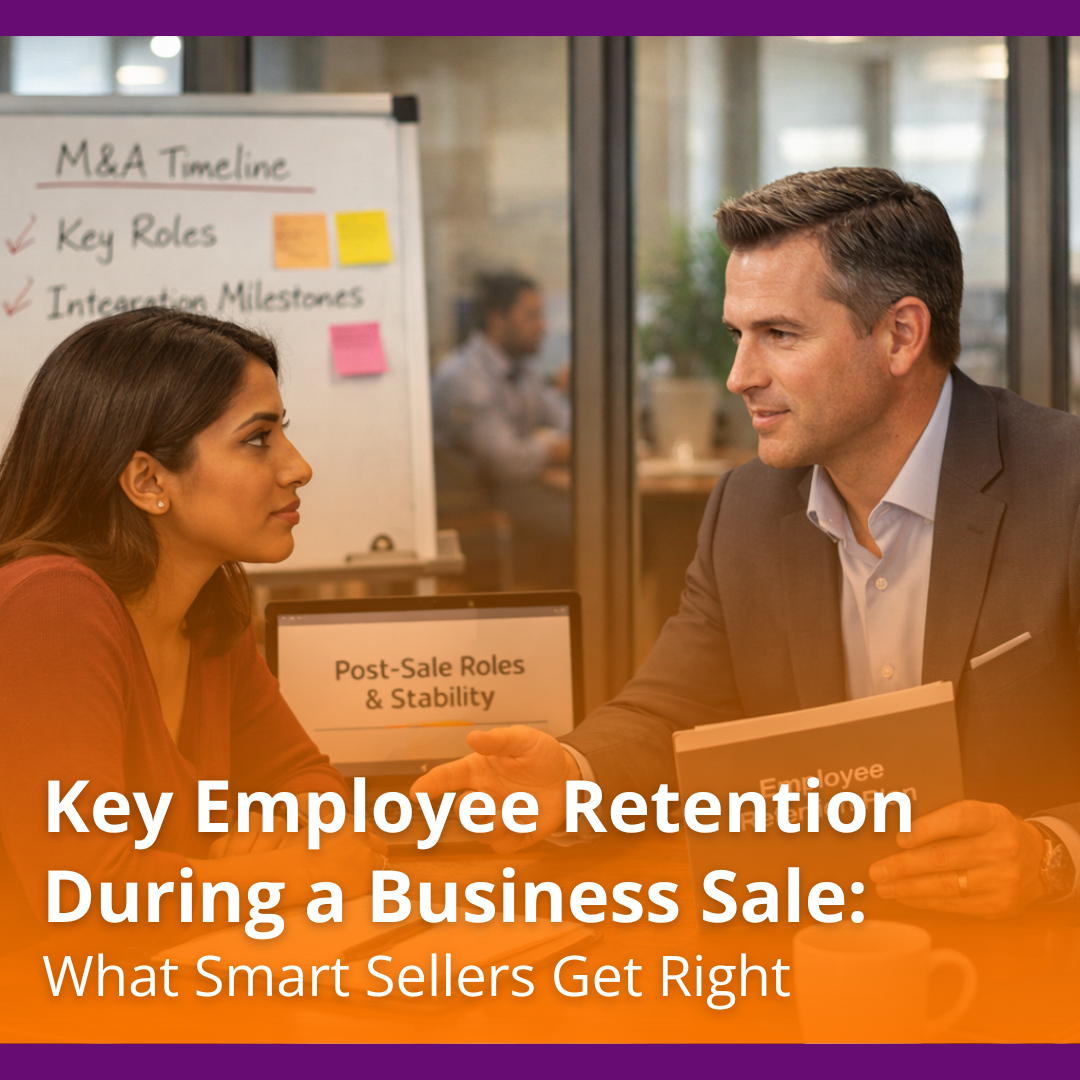How to Know If You’re Emotionally Ready to Sell Your Advisory Practice
You have pictured the day you sell your advisory practice. The deal closes. The pressure lifts.
Comprehensive, data-driven valuations and comparative equity analyses to accurately price your practice, establish market benchmarks, and support informed decision-making.
Comprehensive M&A guidance encompassing deal structuring, negotiation strategies, market listings, and transaction closings.
Comprehensive systems, targeted coaching, and in-depth assessments designed to optimize operational efficiency and enhance advisory team effectiveness.
Strengthen continuity through the implementation of formal continuity agreements, the establishment of legal entities, execution of enforceable legal contracts, and securing appropriate capital resources.
4 min read
 Anthony Whitbeck, CFP®, CLU®
September 2, 2025
Anthony Whitbeck, CFP®, CLU®
September 2, 2025
.png)
In wealth management, consolidation is often framed as progress. Announcements speak of efficiency, synergy, and scale. But every so often, an acquisition is more than a balance sheet transaction — it is a cultural earthquake. The $2.7 billion acquisition of Commonwealth Financial Network by LPL Financial in August 2025 is one such moment.
For LPL, the numbers look triumphant. Absorbing 3,000 advisors and $305 billion in assets expands its empire to nearly 30,000 advisors and $1.8 trillion under management. But for Commonwealth advisors, especially those nearing retirement, this isn’t just a merger of firms. It is a collision of identities.
Since its founding in 1979, Commonwealth stood apart by design. It wasn’t the biggest, but it was often the most beloved. Year after year, it topped J.D. Power’s independent advisor satisfaction rankings. Its reputation rested on culture: intimacy, partnership, and the assurance that advisors mattered as individuals.
Joining Commonwealth meant aligning with a boutique ethos where relationships trumped raw numbers. For many, that culture became part of their professional identity. Now, the concern is whether that legacy can survive the gravitational pull of the industry’s largest independent broker-dealer.
LPL brings unmatched resources. Its platform breadth, technology, and capital strength are undeniable. But culture is not measured in assets under management. The average Commonwealth advisor generates close to $1 million in annual revenue, nearly three times the $350,000 average of LPL advisors.
That gap is about more than economics. It reflects different ways of operating, different peer groups, and different client expectations. For advisors who built their careers in Commonwealth’s boutique model, being absorbed into LPL feels like trading a tailored suit for something off the rack. Prestige matters in wealth management — to advisors and to clients — and many fear that prestige will not survive the merger.
LPL has promised continuity. Commonwealth’s brand, they say, will remain intact. CEO Wayne Bloom stays in place, and integration will be stretched until late 2026 to ease the transition.
But advisors have seen this movie before. LPL’s acquisition of other boutiques, such as Allen & Co., came with similar assurances. Over time, however, distinct identities were blurred. The operational efficiencies of scale reward uniformity, and uniformity eventually prevails.
Skepticism is not cynicism; it is pattern recognition. Advisors know that, despite good intentions, culture rarely survives integration.
For younger advisors, disruption can be reframed as opportunity. They have time to adapt, reposition, or even benefit from LPL’s resources. But for advisors within five years of retirement, the calculus is different. The endgame of a career is about stability, legacy, and client continuity — not disruption.
The LPL acquisition forces a decision point. Some may accelerate retirement rather than endure years of uncertainty. Others may choose to sell now, while valuations remain strong. Still others may seek out smaller firms or RIAs where boutique culture remains.
The timing of this deal matters. Because integration will not be complete until 2026, advisors effectively have a window of opportunity to act before disruption peaks. This pause creates a natural reflection point: continue into an uncertain future, or execute a transition on one’s own terms.
Meanwhile, competitors are circling. Firms like Raymond James, Ameriprise, and Morgan Stanley see discontent among Commonwealth advisors as open season for recruitment. Incentives are generous, and for those near retirement, it may be the most favorable environment they will ever encounter.
There is also the broader demographic reality. Nearly half of financial advisors are expected to retire within five years. This wave of retirements will flood the market with practices for sale, shifting leverage toward buyers. Waiting too long risks selling into a saturated market where valuations are suppressed. Acting now may mean capturing value at its peak.
Beyond market dynamics, the hardest part of selling is often emotional. Advisors worry less about their own finances than about their clients. How will they react? Will they stay? Will the advisor’s legacy endure?
One retiring advisor compared it to “selling the house while the family still lives in it.” The analogy captures the deeply personal nature of these decisions. For many, fear of client reactions delays retirement for years.
And yet, when the conversations finally happen, clients are often more pragmatic than expected. They want to know how changes will affect them, but once reassured, they are supportive. The fear of disruption looms larger than the reality. Which is why the LPL acquisition may, paradoxically, be a gift: it forces advisors to have conversations they have long postponed.
Sell Now at Peak Value
With valuations averaging over $3M and demand still strong, selling now allows advisors to lock in value before the retirement wave depresses prices. A professional valuation provides the foundation for any transition, helping advisors understand their worth and align their next move with long-term goals.
Sell and Stay
Monetize equity while continuing to work for a defined transition period. This strategy reduces risk, preserves legacy, and often results in stronger client retention. It gives advisors the best of both worlds: financial security today with continued client engagement tomorrow.
Partial Equity or Downsizing
Selling part of a practice or downsizing client groups can free up capacity while maintaining involvement. This approach helps advisors regain balance, test succession options, and often improve profitability by focusing on top-tier clients.
The Commonwealth-LPL deal is not unique. It is part of a larger trend reshaping wealth management. Consolidation has been accelerating for years, driven by economies of scale, private equity capital, and the succession crisis of an aging advisor population.
But with each deal, something is lost. The diversity of models that once defined the industry is shrinking. Where advisors could once choose based on cultural alignment, they now face a narrowing field dominated by mega-firms. Commonwealth’s absorption into LPL is not just about one firm’s future — it is a symbol of what boutique independence is up against.
The acquisition highlights a larger collision in the industry: culture versus capital, boutique versus behemoth, legacy versus liquidation. For advisors nearing retirement, the stakes could not be higher. Delay, and they risk losing leverage, value, and control. Act now, and they can still dictate the terms of their exit.
The irony is that advisors spend their careers telling clients to act proactively: de-risk portfolios before retirement, plan transitions before crises. Yet too many fail to apply that wisdom to themselves. They wait, they hope, they postpone — until the decision is made for them.
The LPL-Commonwealth acquisition is a reminder that waiting rarely works in your favor. For advisors at the end of their careers, it is a chance to reclaim control before integration, attrition, and market forces reshape their legacy.
For decades, Commonwealth advisors enjoyed the privilege of practicing in a boutique culture that celebrated individuality and prestige. Now, as that culture collides with LPL’s scale, they face a defining question: will they let their final chapter be dictated by integration, or will they write it themselves?
The answer will not be found in corporate promises. It will be written in the choices advisors make in the next 12 to 24 months. And for near-retirement advisors, the most powerful choice may be to act now — to protect value, preserve legacy, and end their careers on their own terms.
Anthony "Tony" Whitbeck, CFP®, CLU®, is CEO and Owner of Advisor Legacy. He began his career as a financial advisor in 1989 and later shifted to coaching, where he’s guided more than two hundred advisory practices through growth, valuation, and succession. Tony leads Advisor Legacy’s certified third-party valuation engagements and coordinates lending and legal partners to streamline transactions. His articles focus on building transferable enterprise value, mapping internal vs. external exits, and avoiding common succession pitfalls. Drawing on decades of in-the-trenches experience, Tony provides practical, compliance-friendly guidance advisors can use right away.
Receive timely articles, tip sheets, events, and more right in your inbox.

You have pictured the day you sell your advisory practice. The deal closes. The pressure lifts.

Selling a company is often the largest financial event of a business owner’s life. Yet most exit conversations still revolve around valuation and...

Are you preparing to sell your business with a team you want to keep intact? Then you’re already thinking ahead. The moment a sale is in motion, your...